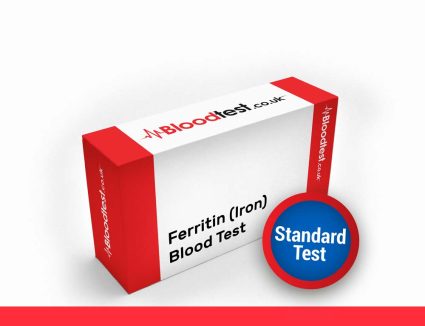Understanding the Significance of Ferritin Blood Tests for Optimal Health Management
Explore Ferritin: The Crucial Protein Responsible for Iron Storage in Your Body

The Ferritin Blood Test in Coatbridge is an essential diagnostic tool used to assess your body’s iron storage levels. Gaining a comprehensive understanding of ferritin is crucial since it operates as a storage protein that holds iron, a vital mineral necessary not only for the production of red blood cells but also for the effective transportation of oxygen throughout your body. When ferritin levels are insufficient, your ability to store iron becomes compromised, potentially leading to severe health complications such as fatigue and anaemia. Ferritin is largely found in the liver, spleen, and bone marrow, and measuring its concentration provides significant insights into your overall iron levels. By evaluating ferritin levels, healthcare professionals can accurately assess your body’s ability to manage its iron reserves, identifying cases of both excess and deficiency.
Choosing to undergo a ferritin blood test in Coatbridge allows you to determine whether your iron stores are sufficient or if you are at risk for conditions like iron overload, which may lead to disorders such as hemochromatosis. This dual functionality highlights the critical role ferritin measurements play, especially for individuals experiencing symptoms like unexplained fatigue, weakness, or pale skin. Regular testing can provide vital information that assists in preventing serious health complications associated with both low and high ferritin levels.
The Indispensable Role of Regular Ferritin Level Testing in Your Health Management Strategy
Monitoring your ferritin levels is essential for diagnosing a wide range of health conditions. Low ferritin levels typically indicate iron deficiency, which is frequently associated with anaemia, a condition that can manifest in various forms and greatly diminish your overall quality of life. On the other hand, elevated ferritin levels may imply iron overload, leading to severe complications, including liver damage and diabetes. Understanding your ferritin levels equips your healthcare provider to develop personalised treatment plans, potentially involving iron supplements, dietary adjustments, or further diagnostic evaluations.
In the UK, particularly in regions like Coatbridge, healthcare professionals routinely recommend ferritin testing for individuals exhibiting symptoms that suggest an iron imbalance. Even if you feel generally well, certain risk factors—including heavy menstruation, pregnancy, or chronic illnesses—may necessitate regular evaluations to ensure your iron levels remain stable and within healthy ranges. Adopting a proactive stance towards your health can be instrumental in preventing long-term complications related to both iron deficiency and overload.
Are You Ready to Make Informed Decisions for Your Health?
 A Detailed Overview of the Ferritin Testing Process
A Detailed Overview of the Ferritin Testing Process
The ferritin blood test in Coatbridge consists of a straightforward yet effective procedure, where a small blood sample is drawn, typically from your arm. You may be curious about the specific steps involved: the entire process generally takes just a few minutes and is performed in a modern medical laboratory. A qualified healthcare professional will first sanitise the area, insert a needle into your vein, and draw a small volume of blood, often described as a quick pinch, ensuring the experience is manageable even for those who may feel anxious about needles.
Once the blood sample is obtained, it is sent to a laboratory for thorough analysis. The lab evaluates the concentration of ferritin in your blood, with results typically available within a few days. These results play a crucial role in providing a comprehensive overview of your iron status, allowing your healthcare provider to make well-informed decisions regarding your health management and any required interventions.
How to Interpret Normal Ferritin Levels and Their Health Implications

Normal ferritin levels can vary significantly based on several factors, including age and gender. Generally speaking, for women, normal ferritin levels range from 20 to 150 micrograms per litre, while for men, the standard range is between 20 to 250 micrograms per litre. It is crucial to interpret these figures within the broader context of your overall health and any symptoms you might be experiencing. A ferritin level at the lower end of the spectrum might suggest that your body struggles to store sufficient iron, whereas levels at the higher end could indicate an excess that requires further investigation.
Being well-informed about normal ferritin levels empowers you to take proactive steps regarding your health. For residents of Coatbridge, understanding these parameters can inspire proactive health actions. If testing reveals abnormal ferritin levels, follow-up consultations will clarify the implications of those results and outline necessary next steps, which may include dietary changes or additional assessments to support improved health management.
Essential Preparations for Your Ferritin Blood Test
Important Pre-Test Guidelines to Ensure Accurate Results
Preparing for a ferritin blood test in Coatbridge can significantly influence the accuracy of your results. Healthcare professionals often recommend adhering to specific pre-test guidelines, which may involve fasting for a certain duration. Fasting is essential as it ensures that any food or supplements consumed do not interfere with the precision of your test results. Additionally, it’s crucial to inform your doctor about any medications or supplements you are currently taking, as certain substances can distort ferritin readings and lead to inaccurate interpretations.
If you are unsure whether fasting is necessary, your healthcare provider will clarify this recommendation based on your health requirements. Keeping a detailed record of your dietary habits and any medications can assist in ensuring a smooth testing experience. Ultimately, being adequately prepared can lead to more reliable outcomes and a clearer understanding of your iron levels.
What to Expect on the Day of Your Ferritin Test

Feeling apprehensive before a blood test is a completely normal reaction. Upon your arrival for your ferritin blood test in Coatbridge, you can expect a serene and professional environment designed to help you feel comfortable. The test itself is quick, lasting no more than a few minutes. A healthcare professional will be present to guide you through the process, alleviating any concerns you may have regarding the procedure.
During the blood draw, you might feel a brief sting or pinch, but this sensation is short-lived. After the test, you can immediately return to your daily activities, making this a convenient way to gain valuable insights into your health without significant downtime. Knowing what to expect can help reduce anxiety levels, resulting in a smoother overall experience.
Steps to Take After Completing Your Ferritin Test
Once your ferritin blood test in Coatbridge is complete, you can resume your usual activities without any restrictions. The only follow-up required is to wait for your results, which are typically available within a few days. In specific cases, your healthcare provider may contact you sooner if your results indicate an urgent need for medical attention.
If you notice any unusual side effects following the test, such as excessive swelling or bruising at the blood draw site, it is advisable to contact your healthcare provider promptly. Overall, the quick turnaround on results facilitates timely discussions about your health, ensuring that you remain well-informed and empowered to make decisions based on your ferritin levels.
Effective Techniques for Reducing Pre-Test Anxiety
Managing anxiety before undergoing a ferritin blood test in Coatbridge is crucial for ensuring a positive experience. While it is natural to feel nervous, employing specific coping mechanisms can help calm your mind. Techniques such as deep breathing exercises can be particularly effective in alleviating your nerves. Taking a moment to breathe deeply—slowly inhaling through your nose and exhaling through your mouth—can help centre your thoughts and foster a sense of calm.
Moreover, listening to calming music or engaging in light conversation with a healthcare professional prior to the test can encourage relaxation. These simple strategies can redirect your focus and create a more serene atmosphere around you. Remember, prioritising your health is essential, and approaching your test with a calm mindset can enhance your overall experience.
Deciphering Your Ferritin Test Results for Enhanced Health Management
Understanding the Standard Ferritin Range and Its Health Implications
Understanding the standard range of ferritin levels is crucial for accurately interpreting your test results. Generally, normal ferritin levels for women range from 20 to 150 micrograms per litre, while for men, the typical range falls between 20 to 250 micrograms per litre. These values may fluctuate based on individual health factors and demographic considerations, underscoring the importance of context when assessing your specific results.
When reviewing your ferritin levels, it is vital to correlate these readings with any symptoms you may be experiencing. For instance, if your ferritin level is on the lower side and you show signs of fatigue, it may indicate a need for dietary adjustments or further medical evaluation. Conversely, elevated ferritin levels could prompt your doctor to investigate potential underlying conditions that might lead to iron overload.
Identifying Elevated Ferritin Levels and Their Associated Health Risks
High ferritin levels can suggest various health issues, such as iron overload disorders, chronic inflammation, or liver disease. If your ferritin blood test in Coatbridge indicates elevated levels, your healthcare provider may recommend additional testing to discover the underlying cause. This is particularly critical, as conditions like hemochromatosis can lead to severe health complications if left unaddressed.
Symptoms associated with high ferritin levels may include joint pain, fatigue, and abdominal discomfort. If you experience any of these symptoms along with abnormal test results, it is essential to consult your healthcare provider for a comprehensive evaluation and potential treatment options. Early intervention can significantly enhance health outcomes, making awareness and understanding of ferritin levels paramount for maintaining wellness.
Recognising Low Ferritin Levels and Their Consequences on Health
Low ferritin levels often indicate iron deficiency, a condition that can lead to anaemia. If your ferritin blood test in Coatbridge reveals low levels, it becomes essential to evaluate your dietary and lifestyle choices. Common symptoms associated with iron deficiency include fatigue, weakness, and pale skin, all of which can severely disrupt daily life and overall health.
Upon diagnosing low ferritin levels, your healthcare provider may recommend dietary changes to enhance your iron intake. Foods rich in iron, such as lean meats, beans, and leafy green vegetables, can be particularly beneficial. In some cases, iron supplements may also be prescribed to quickly replenish your body’s iron stores. Recognising the consequences of low ferritin levels empowers you to take charge of your health and pursue the necessary interventions to improve your condition.
Finding Local Ferritin Testing Services in Coatbridge
Locating Nearby Clinics for Convenient Ferritin Testing
Coatbridge offers several local clinics and GP surgeries where you can conveniently access a ferritin blood test. Many of these healthcare facilities may require a referral from your GP, ensuring that testing aligns with any underlying health concerns you may have. The proximity of local clinics means you won’t have to travel far for essential health assessments, enabling you to effectively prioritise your well-being.
In addition to ferritin testing, these clinics frequently provide comprehensive health services, including routine check-ups and specialised care. Establishing a strong relationship with your local GP can facilitate smoother referrals for tests like ferritin, ultimately ensuring that your health monitoring is thorough, consistent, and tailored to your individual needs.
Exploring Private Laboratories for Ferritin Testing Options
For those seeking quicker and more flexible alternatives, private laboratories in Coatbridge offer ferritin blood tests without requiring a referral. These facilities provide a streamlined process, allowing you to book a test at your convenience and often receive results faster than through traditional NHS routes.
While private testing may incur costs ranging from £50 to £100, it offers the advantage of reduced waiting times and a more personalised service. If you urgently need to understand your ferritin levels, exploring private options could be a worthwhile choice for expediting your health insights.
Utilising Hospital Services for Ferritin Testing
Local hospitals in Coatbridge also feature pathology departments that are well-equipped to perform ferritin blood tests. These healthcare facilities are adept at diagnostic testing and can provide comprehensive support alongside your ferritin assessment. Hospitals generally offer a wealth of resources, including access to specialists who can guide you through any concerns arising from your test results.
Opting for a ferritin test at a hospital may be advantageous if you have a complex medical history or require additional health evaluations. These facilities can conduct multiple tests, ensuring a holistic approach to your health and wellness.
Understanding the Costs and Accessibility of Ferritin Testing
Exploring NHS Ferritin Testing Services and Their Benefits
One of the most significant advantages of residing in the UK is access to the National Health Service (NHS). With a doctor’s referral, you can receive a ferritin blood test in Coatbridge at no cost, ensuring that everyone, regardless of financial circumstances, can effectively monitor their health.
The NHS framework aims to uphold public health, serving as an invaluable resource for residents. If you exhibit symptoms indicative of iron deficiency or overload, your GP will provide the necessary referrals, enabling timely testing and intervention. The accessibility of these services fosters a health-conscious community, encouraging individuals to take proactive measures in managing their well-being.
Understanding the Costs of Private Ferritin Testing
If you opt for private testing, you should expect to pay between £50 and £100 for a ferritin blood test in Coatbridge. Although this cost may exceed that of NHS services, the benefits often include quicker results and flexible appointment scheduling, which can be crucial for those eager to gain insight into their health status.
Many private laboratories also offer a range of health testing services, allowing you to bundle multiple assessments during a single visit, potentially saving you time and money in the long run. It is wise to compare services and prices to identify the option that aligns best with your individual needs and budget.
Insurance Coverage for Ferritin Testing: Essential Information
For individuals with private health insurance plans, verifying whether your provider covers ferritin blood tests is crucial. Many plans include coverage for diagnostic testing, but specifics can vary significantly. Understanding your coverage can alleviate financial concerns and provide more accessible testing options.
If your insurance does cover ferritin testing, ensure you follow all necessary procedures outlined by your provider to maximise your benefits. This may involve obtaining pre-approval or adhering to specific testing guidelines to guarantee a seamless process.
Community Health Programs Enhancing Access to Ferritin Testing
Local community health initiatives in Coatbridge may provide subsidised or complimentary ferritin blood tests to support underserved populations. These programs aim to enhance access to healthcare services, focusing on preventive care and the early detection of potential health issues.
Participating in community health initiatives not only benefits you personally but also contributes to the overall health of the community. It is worthwhile to explore local resources and programs designed to improve public health, particularly for individuals at heightened risk of iron deficiency or overload.
Post-Test Follow-Up Procedures and Treatment Strategies for Optimal Health
Engaging in Meaningful Conversations with Your Doctor About Test Results
After receiving your ferritin blood test results in Coatbridge, the next essential step is to consult your GP. Engaging in a thorough discussion about your results will clarify their implications and help determine the best course of action. Your doctor will explain what your ferritin levels indicate concerning your overall health and lifestyle factors.
This consultative approach is vital, as it promotes informed decision-making. If your ferritin levels are abnormal, your GP may recommend further testing or refer you to a specialist for a detailed evaluation. Being open and honest about your symptoms during this discussion can facilitate a more tailored and effective treatment plan.
Making Dietary Adjustments Based on Your Ferritin Levels
Depending on the outcomes of your ferritin blood test in Coatbridge, dietary modifications may be necessary. If your results indicate low ferritin levels, incorporating iron-rich foods into your diet becomes imperative. Foods high in iron, such as red meat, poultry, fish, beans, and fortified cereals, can be particularly advantageous. Pairing these foods with options rich in vitamin C, like citrus fruits, enhances iron absorption, maximising the effectiveness of your dietary changes.
Conversely, if your ferritin levels are elevated, your GP may recommend reducing your intake of iron-rich foods or limiting vitamin C, which enhances iron absorption. Understanding these dietary implications empowers you to take control of your health and potentially reverse conditions related to iron imbalance.
Exploring Medical Interventions for Effective Ferritin Management
In scenarios where dietary adjustments alone are insufficient, medical interventions may become necessary following your ferritin blood test in Coatbridge. If low ferritin levels are confirmed, your doctor might prescribe iron supplements to rapidly replenish your iron stores. Conversely, if your ferritin levels are elevated, treatments may involve chelation therapy—a procedure designed to help eliminate excess iron from your body.
Implementing these medical interventions can significantly improve your health, particularly in preventing complications associated with both iron deficiency and overload. It is essential to actively engage in this process, collaborating closely with your healthcare provider to monitor your progress and ensure effective management of your condition.
The Importance of Regular Ferritin Testing for Maintaining Optimal Health
Health Monitoring Through Consistent Ferritin Testing
Regularly monitoring your ferritin levels is vital for effectively managing conditions such as anaemia or hemochromatosis. Routine testing facilitates the early identification of iron imbalances, enabling prompt interventions. For individuals with a history of iron-related health issues, particularly those residing in Coatbridge, consistent ferritin testing can be a critical measure to safeguard your well-being.
Taking a proactive approach to your health through regular testing empowers you to make informed lifestyle and dietary choices that can significantly impact your long-term health. Establishing a routine for health checks allows you to stay ahead of potential health issues and maintain optimal wellness.
Advocating for Early Detection of Health Issues
A key component of effective healthcare is the early detection of diseases. Regular ferritin testing can assist in identifying imbalances before they escalate into more serious health concerns. For example, recognising low ferritin levels early can prompt dietary modifications or supplement recommendations that can rectify deficiencies before they develop into full-blown anaemia.
Furthermore, monitoring ferritin levels can help diagnose chronic conditions that may arise from iron overload, such as liver disease. Staying vigilant about your ferritin status empowers you to take charge of your health and strive for optimal wellness over time.
Frequently Asked Questions About Ferritin Testing
What does a ferritin blood test measure?
A ferritin blood test measures the level of ferritin in your blood, indicating the amount of stored iron in your body. This assessment is crucial for evaluating your iron status and diagnosing conditions like anaemia or iron overload.
How should I prepare for a ferritin blood test?
Preparation may involve fasting for a specific period and informing your healthcare provider about any medications you’re taking. Adhering to your healthcare provider’s specific instructions is vital to ensure accurate results.
What do low ferritin levels indicate?
Low ferritin levels typically signify iron deficiency, which can lead to anaemia. Symptoms might include fatigue, weakness, and pale skin, necessitating further dietary changes or medical intervention.
What do high ferritin levels mean?
Elevated ferritin levels can indicate iron overload, liver disease, or chronic inflammation. Further testing and evaluation by a healthcare provider are generally required to determine the underlying cause.
Does health insurance cover ferritin tests?
Many health insurance plans cover ferritin tests, but it is essential to check with your provider for specific details and any pre-authorisation requirements.
Where can I get a ferritin test in Coatbridge?
You can obtain a ferritin test at local GP surgeries, private laboratories, or hospitals in Coatbridge. Some facilities may require a referral, while others offer direct access to testing.
How long does it take to receive ferritin test results?
Results from a ferritin blood test are typically available within a few days. However, some private laboratories may provide quicker results depending on their operational processes.
What dietary changes can I implement if my ferritin is low?
To increase ferritin levels, it is advisable to include iron-rich foods such as red meat, legumes, and leafy greens in your diet. Pairing these foods with vitamin C-rich options can enhance absorption.
What treatment options exist for high ferritin levels?
If diagnosed with high ferritin levels, treatment may involve dietary changes, medications, or chelation therapy to eliminate excess iron from your body. Consult your healthcare provider for personalised guidance tailored to your situation.
How frequently should I be tested for ferritin levels?
The frequency of ferritin testing depends on individual health circumstances. Individuals with a history of iron-related issues may require more frequent testing, while others can follow a routine schedule based on their doctor’s recommendations.
Connect with us on Facebook!
This Article Was First Found On https://bloodtest.co.uk
The Article Ferritin Blood Test: Key Insights for Coatbridge Residents Was Found On https://limitsofstrategy.com



